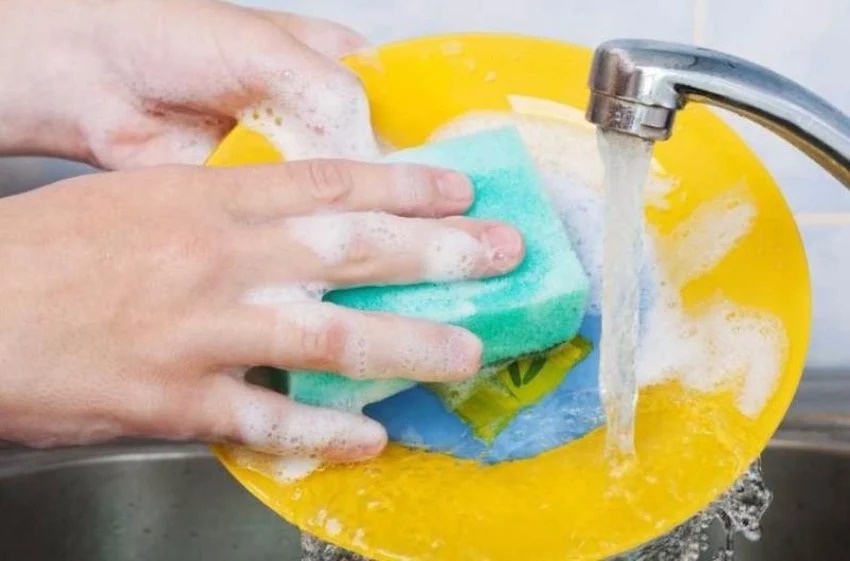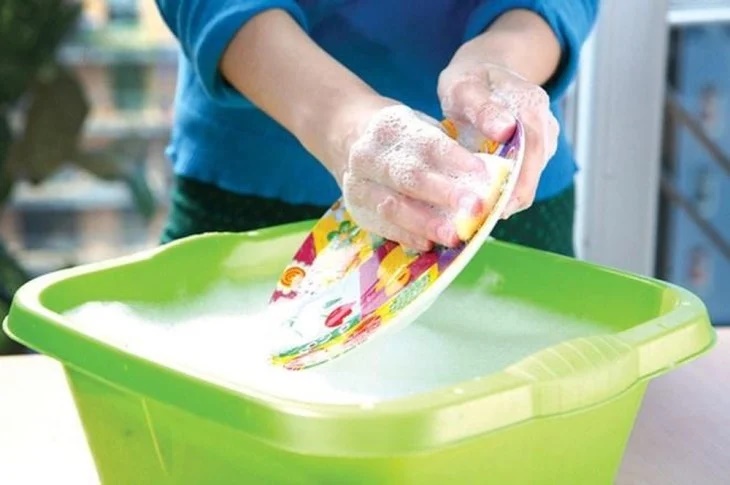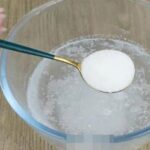The following insights will help you be more mindful when washing dishes to protect your health and that of your family.
Pouring Detergent Directly onto Dishes
While it is common for people to pour dishwashing liquid directly onto dishes when washing, aiming for a better clean, this practice is discouraged by experts and scientists for two reasons. Firstly, it is wasteful, and secondly, it can be harmful to your health. When detergent is poured directly onto dishes, it is likely that a significant amount of chemical residue will remain even after rinsing with water. Using these dishes to serve food can cause the chemicals to transfer to the food and subsequently enter your body, potentially causing health issues over time.

Instead, dilute a small amount of dishwashing liquid in water and stir until suds form. Use this solution to wash dishes, or apply some detergent onto a wet sponge, lather, and then proceed to wash. Afterward, rinse thoroughly at least twice with clean water and a chemical-free cleaning cloth.
Soaking Dishes in Detergent for Extended Periods
For heavily soiled dishes, you might be tempted to soak them in a diluted detergent solution for a long time before washing them properly. However, this is a harmful practice. The longer dishes are soaked in detergent, the higher the chance of chemical absorption, especially for products made from bamboo or wood. Once these chemicals are absorbed, it is nearly impossible to remove them completely.

For chipped or cracked items, such as plates, bowls, and porcelain in general, it is highly likely that chemical residues will remain on the damaged surfaces even after multiple rinses. Therefore, it is best to refrain from using damaged items for serving food.
Using Excessive Detergent for One Wash
Driven by the desire for “cleaner” dishes, many people tend to overuse dishwashing liquid. However, using too much detergent makes it challenging to remove all the chemicals from dishes, even after several rinses. This can lead to chemical contamination of food when using these dishes again, and these chemicals can accumulate in the body over time, potentially causing health issues.
Additionally, excessive use of detergents can harm the environment. When large quantities of these chemicals are released into the environment, they pollute water sources and ecosystems. Therefore, using dishwashing liquids and other chemicals sparingly is also a way to protect our environment.
Using Dishwashing Liquid of Unknown Origin
All cleaning products contain harmful chemicals, but unbranded or unknown-origin products pose a higher risk to human health. These products may contain banned toxic chemicals as they are not subject to quality control, and their manufacturing processes are often unclear, potentially leading to dangerous chemical reactions and by-products.
While some believe that the harm from these chemicals is limited to dry skin, clinical studies suggest that toxic substances in cleaning solutions can penetrate the skin and enter the body through digestion and respiration. Prolonged exposure can lead to skin thinning and, in the long term, skin cancer and other severe health issues. Therefore, it is crucial for homemakers to understand the ingredients in their cleaning products and opt for reputable brands approved by relevant authorities.
Furthermore, it is recommended to dilute dishwashing liquid before use to minimize detergent residue.
According to Cars and Sports
The Ultimate Guide to Packing for Quarantine: What to Bring When You Have to Leave in a Hurry
In the face of the escalating Covid-19 situation, centralized quarantine facilities play a crucial role in curbing the spread of the virus into the community. But what are the essential items you should prioritize bringing if you ever find yourself in quarantine? Let’s explore this important topic together!






































